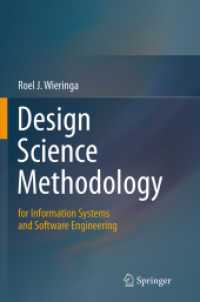- ホーム
- > 洋書
- > ドイツ書
- > Mathematics, Sciences & Technology
- > Technology
- > electronics, electrical engineering, telecommunications
Full Description
This book develops a method for economic-technological forecasting of the optimal functioning and parameters of the energy system. The relevance of this work is determined by current trends and challenges in the field of energy and sustainable development, considering the following key points: 1. transition to renewable energy: Optimizing the structure of integrated energy systems with a focus on renewable energy sources and distributed generation is crucial for achieving sustainable development goals and mitigating climate change. 2. Technological progress: Continuous advancements in generation technologies, energy storage, and smart grid development provide new opportunities for the optimal integration of renewable energy into existing and new energy systems. Models and tools that can promptly track the variability and intermittency of renewable sources are essential for making optimal management decisions to ensure the reliability and resilience of energy systems. 3. Environmental impact: Optimizing energy systems using renewable sources helps reduce greenhouse gas emissions and minimize negative environmental impacts. 4. Integration of energy storage: Effective use of energy storage technologies is a key aspect of optimizing energy systems with a high share of renewable energy sources. Models that address the optimal integration of energy storage (batteries) and demand response strategies are crucial for maintaining the stability of electricity generation and supply. 5. Social significance: Research into models and means of optimizing the implementation of renewable energy can contribute to creating effective scenarios. 6. Economic competitiveness: Reducing the costs of renewable energy technologies combined with the potential savings from optimizing the operation modes of traditional generation makes the integration of renewable energy economically attractive. Thus, the task of developing new and improving existing methods and economic-mathematical models for studying the directions and optimal parameters of the technological development of energy system elements is a relevant scientific problem that needs to be addressed.
Contents
Current Trends in Modeling and Updating the Dissemination Processes of Energy Conversion and Utilization Technologies in the Energy Sector of Ukraine.- Mathematical Models and Programming Tools for Optimizing the Composition and Operating Modes of Energy Systems under Rapid Growth of Renewable Energy Capacities.- Software and Information Complex for Modeling Integrated Multi Node and Autonomous Electric and Heat Supply Systems.- Modeling and Synchronizing Energy Systems of Ukraine and Europe A 2050 Perspective.








